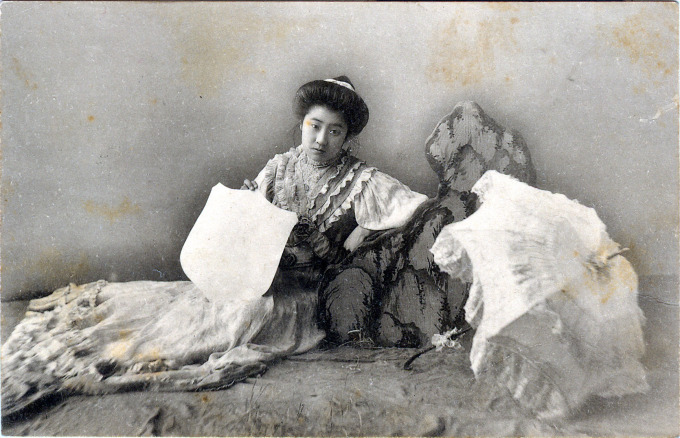“The first reported instance of women appearing in Western attire is said to have been 1858, when prostitutes in the Maruyama, Nagasaki licensed quarter posed in Western dress with Dutchmen. Lower-class women who became the exclusive concubines of Western men were frequently seen in public in Western attire—earning them the derogatory sobriquet rashamen, or ‘wool women.’
“It took the Meiji Empress to redeem Western attire for the fairer sex. In 1886 she declared that all women associated with the court would be required to dress in Western garments for imperial functions. In defending her proclamation, she referred to the past and offered that before the importation of the one-piece (wan piisu) garment from China, Japanese women had worn skirts. She urged her countrywomen to cast aside the old-fashioned, Chinese-inspired Japanese wear (wafuku) in favor of Western wear (yofuku), which was actually closer in spirit, she declared, to indigenous Japanese costume. The empress concluded her proclamation with an admonition:
In carrying out this improvement, however, be especially careful to use materials made in our own country. If we make good use of our domestic products, we will assist in the improvement of techniques of manufacture on the one hand, and will also aid the advancement of art and cause business to flourish. Thus the benefits of this project will reach beyond the limits of the clothing industry.
“Wearing Western dress was not just a matter of fashion, therefore, but a patriotic duty.”
– Fashioning the Feminine: Images of the Modern Girl Student in Meiji Japan, Rebecca Copeland, 2006
Changing fashion (Western dress), c. 1910.
1910s • Fashion • Geisha/Maiko/Onnanoko • Imperial Household
Tagged with: Bijin, Fashion, Western dress, Yofuku
Please support this site. Consider clicking an ad from time to time. Thank you!



Pingback: Geta (Footwear) | Old Tokyo
Pingback: Kimono fashion, c. 1910. | Old Tokyo
Pingback: “Modern Shampoo” advertising postcard, c. 1935. | Old TokyoOld Tokyo
Pingback: Changing fashion (school uniform), c. 1920. | Old TokyoOld Tokyo
Pingback: Monpe (plain trouser) fashion, c. 1940. | Old TokyoOld Tokyo